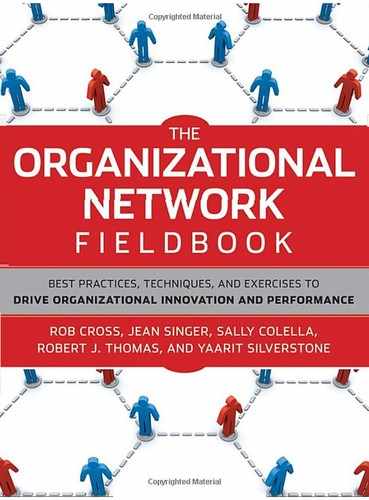2.3. Network Roles and Responsibilities
Conventional wisdom holds that for a community to succeed, its members must truly feel ownership of the community, which motivates a range of behaviors that are necessary for its success. Studies suggest that leaders naturally emerge over time as conversations happen among members and as those who care the most about the success of the community step forward. As with its network formation experience, ConocoPhillips found out early in the process that this conventional wisdom actually harmed the company's efforts. When members saw a swirling, unfocused mass of interactions, they had trouble seeing how they fit in.
The company therefore went against the traditional perspective by explicitly formalizing a range of roles and responsibilities at the outset of a new network. Taking advantage of the decentralized nature of the firm, which has autonomous business units around the world, each NoE was built by allocating roles such as leaders and core team members to individuals across geographic locations, thereby creating a new kind of linking mechanism. The four main roles are sponsor, leader, coordinator, and core member.
2.3.1. Sponsor
Successful networks have a sponsor, a senior mid-level manager who may be selected by an appropriate business leader but may also be a self-selected champion or a subject matter expert (SME). Network sponsors work closely with network leaders to charter and champion the network, and they coordinate with senior management and business units to ensure that the network is focused on strategically valuable goals and improvement opportunities. They provide the foundation, direction, and governance that attract the masses to participate in network activities, with a goal of fostering widespread interest and enthusiasm for knowledge sharing and network participation.
During a network's developmental stages, sponsors provide input and validate the business case, participate in the network assessment process, and refine the operating model as the general ConocoPhillips approach to networks is customized for their needs. As the network matures, sponsors and leaders guide improvements and make sure that participants are being served, goals are measured and met, and adequate resources are applied.
2.3.2. Leader
For a network to be successful from the beginning, it must have a formal leader. Often selected by sponsors and then approved by the business, these mid-level individuals leverage relationships with others in an effort to guide the direction of the network's knowledge-sharing goals and objectives. Leaders provide active support (as opposed to vocal yet passive support) by helping design the network and removing any organizational obstacles.
Connecting globally dispersed units is not easy, and network leaders are key to knitting together efforts across a set of decentralized business units to ensure buy-in from locations around the world. Leaders are also crucial in encouraging SMEs, network members, and other thought leaders to participate and take on roles that promote knowledge sharing. Leaders help create the business case, assess the network's effectiveness, and hone its operating model. They must be willing to "manage up" because they may be informally directing network members who are above them in the company's formal hierarchy.
2.3.3. Coordinator
Successful networks at ConocoPhillips also have a local coordinator, who works with the network leader to provide local and regional input into the network's operations and eventual upgrades. Typical responsibilities of a network coordinator include monitoring peer-to-peer questions occurring within the network to make sure answers are provided expeditiously and helping manage the content of a network, such as lessons learned and best practices. Coordinators also manage the overall look and feel of network portal sites and help manage regular training and awareness campaigns.
2.3.4. Core Member
Finally, successful ConocoPhillips networks have core members, who drive connectivity down to the local and regional levels. Core members are a select group of general network members who are nominated by the sponsor and leader to ensure broad coverage in subject matter expertise and geographical areas of the business. In addition to serving as important role models through their active participation in many front-line network activities, core members help steer the evolution of the network under the guidance of sponsors and leaders. They are heavily engaged in formulating and executing plans to ensure that network deliverables reach the local and regional levels, and they broker connections between question askers and SMEs.
Through their engagement in day-to-day activities, core members often know who might be the best resource for a particular challenge and can ensure appropriate knowledge sharing. As such, core members serve a vital role in expanding the number of general members who can contribute expertise.
2.3.5. Assigning Roles
Management cannot assign people to a network role without considering how that will affect their workloads and careers. ConocoPhillips has found that the best way to manage this is to include these duties as part of people's expected contributions to the company, while scaling back other duties. The key here is to present the network as critically important to the business, not as an "extra activity" that is separate from individuals' regular work activities.
Heavy engagement with a network should not pull people away from their core jobs, and many employees prefer to engage in demanding network roles only for a specific period of time. Thus, ConocoPhillips has found that it is healthy to rotate individuals in and out of network roles roughly every two to three years. The strong benefits of network involvement can be seen in the many employees who have been heavily engaged in a network role and have then used that experience to position themselves for advancement within the company. It's clear that the breadth of experience that individuals acquire in their network roles more than makes up for the time away from their core jobs. As they wrap up their formal network duties, most continue to be strong network advocates and contributors, which can help encourage participation.
